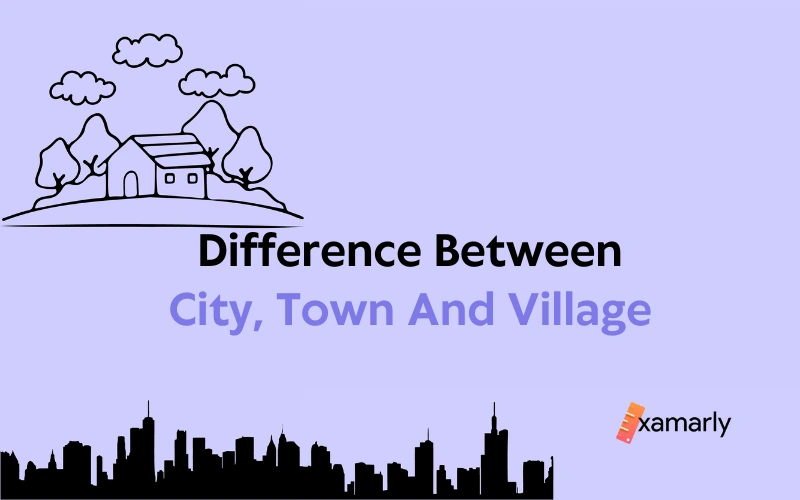An Overview
Are you trying to understand the difference between a city, town, or village in detail?
Each type of community has its own unique characteristics and advantages, but it can be difficult to understand the differences between them.
In this blog, we will take a closer look at the key distinctions between cities, towns, and villages, including their size, population density, and amenities. We’ll also discuss the pros and cons of each type of community.
Read along to acquire an understanding of these three different types of settlements and the factors related to them which make them distinct from each other.
What Is A City?
It is a large and densely populated urban area, typically characterised by a complex network of social, economic, and political systems. Cities are centres of human activity, with a diverse population and a wide range of economic, cultural, and social activities.
The term city is often used to refer to a specific urban area or municipality, but it can also be used more broadly to refer to any urban area or metropolis.
Examples Of Cities
There are many examples of cities around the world, each with its own unique history, culture, and character. Some well-known examples include:
- New York City, USA: Known for its iconic skyline, world-renowned landmarks, and vibrant cultural scene, New York City is often considered the cultural capital of the world.
- London, UK: As the capital of the United Kingdom, London is home to many historical and cultural landmarks, as well as a diverse population and a thriving economy.
- Tokyo, Japan: As the capital of Japan, Tokyo is known for its advanced technology, bustling streets, and unique blend of traditional and modern culture.
- Rio de Janeiro, Brazil: Known for its beautiful beaches, Carnival celebrations, and iconic Christ the Redeemer statue, Rio de Janeiro is a popular tourist destination and a cultural hub of South America.
- Beijing, China: As the capital of China, Beijing is known for its rich history and culture, as well as its role as a major economic and political centre.
Benefits Of Residing In A City
Cities have many benefits, including:
- Economic growth: They are often centres of economic activity, with a wide range of businesses and industries. This can lead to job opportunities and economic prosperity for the residents.
- Cultural diversity: They are home to a diverse population, which can lead to a rich cultural scene and a wide range of cultural experiences.
- Access to resources: They often have more resources, such as hospitals, libraries, and educational institutions, than smaller towns or rural areas.
- Access to transportation: They often have a well-developed transportation system, which can make it easier for residents to get around and access resources.
- Opportunities for social and political participation: They often have a more active and engaged citizenry, with more opportunities for residents to get involved in the community and political activities.
Drawbacks Of Residing In A City
Despite the many benefits of cities, there are also some drawbacks, including:
- Overcrowding: They can become overcrowded, which can lead to problems such as traffic congestion and air pollution.
- High cost of living: They often have a higher cost of living than smaller towns or rural areas, which can make it difficult for some residents to afford basic necessities.
- Social isolation: They can be anonymous places, where people may feel disconnected from their community.
- Crime: They often have higher crime rates than smaller towns or rural areas.
- Stressful and fast-paced life: They are often fast-paced and high-pressure environments, which can be stressful for residents.
What Is A Town?
A town is a human settlement that is larger than a village but smaller than a city. The exact definition of a town can vary depending on the country or region.
For instance- In the United States, a town is typically considered to be a municipality with a population of less than 25,000 people. In the United Kingdom, a town is typically considered to be any settlement with a market or a charter, regardless of its population size.
Examples of Towns
There are many different examples of towns all over the world. Some examples include:
- Auburn, Alabama, USA
- Cirencester, England
- Hervey Bay, Australia
- Kamakura, Japan
- Mariposa, California, USA
Benefits Of Residing In A Town
Towns offer a number of benefits to their residents. Some of the main advantages of living in a town include:
- Convenience: Towns are often located near larger cities and offer easy access to urban amenities such as shopping, dining, and entertainment.
- Sense of community: Towns tend to have a strong sense of community, with many residents knowing each other and participating in local events and activities.
- Safety: Towns tend to be safer than larger cities, with lower crime rates and a greater sense of security.
- Quality of life: Towns offer a good quality of life, with plenty of green space, good schools, and a variety of housing options.
Drawbacks Of Residing In A Town
Despite their many benefits, towns also have some drawbacks. Some of the main disadvantages of living in a town include:
- Limited job opportunities: Towns often have fewer job opportunities than larger cities.
- Limited cultural diversity: Towns tend to be more homogeneous than larger cities, with fewer people from different backgrounds and cultures.
- Limited nightlife: Towns often have less nightlife than larger cities, with fewer bars, clubs, and other venues for socialising.
- Limited public transportation: Towns often have less public transportation than larger cities, making it more difficult to get around without a car.
What Is A Village?
Villages are small, rural communities that are typically found in the countryside. They are characterised by a close-knit group of residents, a strong sense of community, and a shared way of life.
While the definition of a village can vary depending on the context and location, it is generally considered to be a small, rural settlement that is not considered to be a city or town.
In simple words, a village is typically defined as a small, rural settlement that is not considered to be a city or town. The exact population size can vary depending on the location, but it is generally considered to be smaller than a town or city.
Examples Of Villages
There are countless examples of villages around the world, each with its own unique characteristics and way of life. Some examples include:
- Giethoorn, Netherlands: This picturesque village is known for its network of canals, which are used for transportation instead of roads.
- Shirakawa-go, Japan: This village is famous for its traditional thatched-roof houses, known as gassho-zukuri, which have been designated as a UNESCO World Heritage Site.
- Murs, France: This small village in the South of France is known for its beautiful medieval architecture and stunning hilltop location.
Benefits Of Residing In A Village
Villages have many merits, which include:
- Strong sense of community: Villages are typically characterised by a close-knit group of residents who have a strong sense of community and a shared way of life. This sense of community can provide a sense of belonging and support for residents.
- Low crime rates: Villages often have lower crime rates than larger urban areas, which can provide a safer environment for residents.
- Natural beauty: Many villages are located in picturesque, rural areas which can provide residents with access to natural beauty and outdoor recreational opportunities.
Drawbacks Of Residing In A Village
While villages have many merits, they also have some demerits, which include:
- Limited job opportunities: Villages typically have a smaller economy than larger urban areas, which can limit the job opportunities available to residents.
- Limited access to services: Villages may have limited access to services such as healthcare, education, and shopping, which can make it difficult for residents to access these necessities.
- Isolation: Villages can be isolated from larger urban areas, which can make it difficult for residents to access cultural and social opportunities.
Difference Between City, Town And Village
The table provided below helps to understand the difference between these three settlements in a comprehensive manner.
| Factors For Comparison | City | Town | Village |
| Population size | >100,000 | <25,000 | <5,000 |
| Urbanisation | High | Medium | Low |
| Access to amenities | High | Medium | Low |
| Cost of living | High | Medium | Low |
| Employment opportunities | High | Medium | Low |
| Crime rate | High | Low | Low |
| Public transportation | High | Medium | Low |
| Noise level | High | Medium | Low |
| Air pollution | High | Medium | Low |
| Green space | Low | Medium | High |
| School quality | Medium | High | High |
| Housing options | High | High | Medium |
| Sense of community | Low | High | High |
| Cultural diversity | High | Medium | Low |
| Nightlife | High | Medium | Low |
| Access to medical facilities | High | Medium | Low |
| Access to recreational facilities | High | Medium | Low |
| Tax rates | High | Medium | Low |
| Access to higher education institutions | High | Medium | Low |
Note: This is just a tabulation of general trends, and actual values can vary depending on the location and characteristics of the specific city, town, or village.
Related Articles:
| Difference Between Village And City | Difference Between Village Life And City Life |
| Difference Between Town And Village | Difference Between Communism And Communalism |
Summing Up
This blog on the topic “Difference between city, town, and village” can be summarised in a few points. They have been listed below:
- Cities are complex and dynamic urban areas that play a vital role in the economic, cultural, and social life of the country.
- Cities have benefits such as economic growth, cultural diversity, and access to resources but also have drawbacks such as overcrowding, high cost of living, and social isolation.
- Towns are human settlements larger than villages but smaller than cities with unique characteristics.
- Towns offer benefits such as convenience, a sense of community, safety, and quality of life, but also have drawbacks such as limited job opportunities, limited cultural diversity, limited nightlife, and limited public transportation.
- Villages are small, rural communities characterised by a close-knit group of residents, a strong sense of community, and a shared way of life.
- Villages have merits such as a strong sense of community, low crime rates, and natural beauty, but also have demerits such as limited job opportunities, limited access to services, and isolation.
- The choice of living in a city, town or village ultimately depends on personal preferences and lifestyle.
FAQs Related To City, Town And Village
What Is The Difference Between A City, Town, And Village?
A city is a large human settlement, typically with a population of over 100,000 people. A town is typically considered to be a smaller human settlement, with a population of fewer than 25,000 people. A village is a small human settlement, with a population of fewer than 5,000 people.
What Are The Typical Amenities Of A City?
Cities offer a wide variety of amenities, including a diverse range of shops and restaurants, cultural institutions such as museums and theatres, and a variety of recreational opportunities. Cities also typically have better public transportation and more job opportunities than smaller towns or villages.
What Are The Benefits Of Living In A Small Town?
Small towns offer a sense of community, with many residents knowing each other and participating in local events and activities. Small towns also tend to be safer than larger cities and offer a good quality of life, with plenty of green space, good schools, and a variety of housing options.
Are Villages Typically More Isolated Than Towns Or Cities?
Yes, villages tend to be more isolated than towns or cities, as they have fewer amenities and job opportunities. However, many villages are located near larger towns or cities, which can provide easy access to urban amenities and job opportunities.
What Are The Downsides Of Living In A Big City?
Big cities can be expensive to live in, with high housing costs and cost of living. Cities can also be more crowded and have more crime than smaller towns or villages. Also, public transportation can be more expensive and complex in large cities, and the noise and pollution levels may be higher than in smaller towns or villages.
Are Towns Typically More Affordable Than Cities?
It can vary depending on the location, but generally, towns tend to be more affordable than cities. Town’s cost of living, housing prices, and taxes are typically lower than in larger cities.






